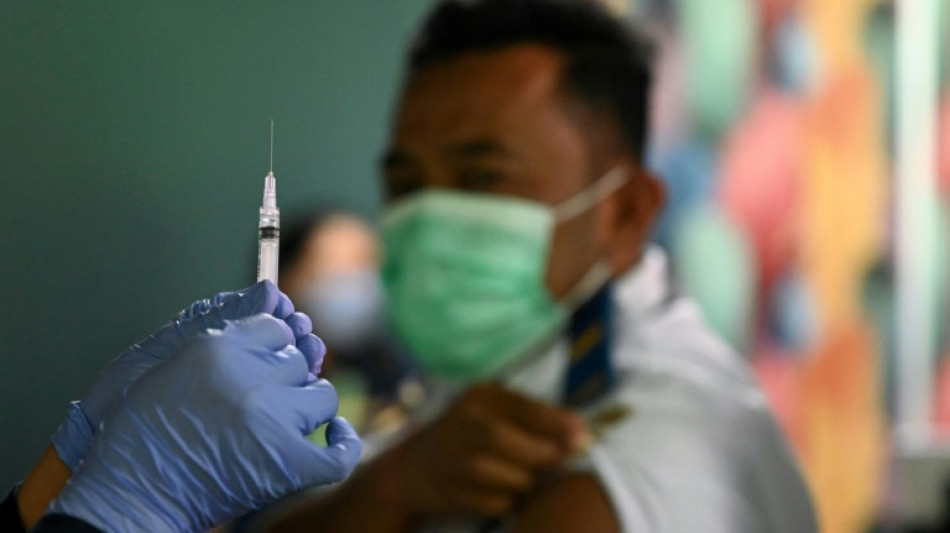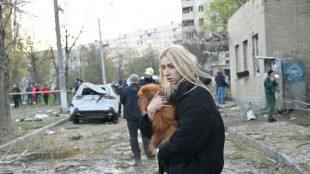
-
 SFWJ / Medcana Announces Strategic Expansion Into Australia With Acquisition of Cannabis Import and Distribution Licenses
SFWJ / Medcana Announces Strategic Expansion Into Australia With Acquisition of Cannabis Import and Distribution Licenses
-
US to withdraw some 1,000 troops from Syria

-
 Four killed after spring storms wreak havoc in the Alps
Four killed after spring storms wreak havoc in the Alps
-
Spurs' Popovich reportedly home and well after 'medical incident'

-
 Trump goes to war with the Fed
Trump goes to war with the Fed
-
Celtics chase second straight NBA title in playoff field led by Thunder, Cavs

-
 White House site blames China for Covid-19 'lab leak'
White House site blames China for Covid-19 'lab leak'
-
Norris edges Piastri as McLaren top Jeddah practice

-
 Trump warns US could ditch Ukraine talks if no progress
Trump warns US could ditch Ukraine talks if no progress
-
Judge denies Sean 'Diddy' Combs push to delay trial

-
 80 killed in deadliest US attack on Yemen, Huthis say
80 killed in deadliest US attack on Yemen, Huthis say
-
Lebanon says two killed in Israeli strikes in south

-
 Trump says US will soon 'take a pass' if no Ukraine deal
Trump says US will soon 'take a pass' if no Ukraine deal
-
F1 success is 'like cooking' - Ferrari head chef Vasseur

-
 Cycling mulls slowing bikes to make road racing safer
Cycling mulls slowing bikes to make road racing safer
-
Macron invites foreign researchers to 'choose France'

-
 Klopp 'happy' in new job despite Real Madrid rumours: agent
Klopp 'happy' in new job despite Real Madrid rumours: agent
-
Alcaraz into Barcelona semis as defending champion Ruud exits

-
 Vance meets Italy's Meloni before Easter at the Vatican
Vance meets Italy's Meloni before Easter at the Vatican
-
Evenepoel returns with victory in Brabantse Pijl

-
 Maresca confident he will survive Chelsea slump
Maresca confident he will survive Chelsea slump
-
Mob beats to death man from persecuted Pakistan minority

-
 Lebanon says one killed in Israeli strike near Sidon
Lebanon says one killed in Israeli strike near Sidon
-
Arsenal's Havertz could return for Champions League final

-
 US officials split on Ukraine truce prospects
US officials split on Ukraine truce prospects
-
Client brain-dead after Paris cryotherapy session goes wrong

-
 Flick demands answers from La Liga for 'joke' schedule
Flick demands answers from La Liga for 'joke' schedule
-
'Maddest game' sums up Man Utd career for Maguire

-
 Trial opens for students, journalists over Istanbul protests
Trial opens for students, journalists over Istanbul protests
-
Gaza rescuers say Israeli strikes kill 24 after Hamas rejects truce proposal

-
 'Really stuck': Ukraine's EU accession drive stumbles
'Really stuck': Ukraine's EU accession drive stumbles
-
'Not the time to discuss future', says Alonso amid Real Madrid links

-
 74 killed in deadliest US attack on Yemen, Huthis say
74 killed in deadliest US attack on Yemen, Huthis say
-
Southgate's ex-assistant Holland fired by Japan's Yokohama

-
 Vance meets Meloni in Rome before Easter at the Vatican
Vance meets Meloni in Rome before Easter at the Vatican
-
Ryan Gosling to star in new 'Star Wars' film

-
 Hamas calls for pressure to end Israel's aid block on Gaza
Hamas calls for pressure to end Israel's aid block on Gaza
-
Russia says Ukraine energy truce over, US mulls peace talks exit

-
 58 killed in deadliest US strike on Yemen, Huthis say
58 killed in deadliest US strike on Yemen, Huthis say
-
Museums rethink how the Holocaust should be shown

-
 Three dead after deadly spring storm wreaks havoc in the Alps
Three dead after deadly spring storm wreaks havoc in the Alps
-
No need for big changes at Liverpool, says Slot

-
 Bloody Philippine passion play sees final performance of veteran 'Jesus'
Bloody Philippine passion play sees final performance of veteran 'Jesus'
-
New US envoy prays, delivers Trump 'peace' message at Western Wall

-
 Postecoglou sticking around 'a little longer' as Spurs show fight in Frankfurt
Postecoglou sticking around 'a little longer' as Spurs show fight in Frankfurt
-
US threatens to withdraw from Ukraine talks if no progress

-
 Tears and defiance in Sumy as Russia batters Ukraine border city
Tears and defiance in Sumy as Russia batters Ukraine border city
-
Russia rains missiles on Ukraine as US mulls ending truce efforts

-
 Tokyo leads gains in most Asian markets on trade deal hopes
Tokyo leads gains in most Asian markets on trade deal hopes
-
Two missing after deadly spring snowstorm wreaks havoc in the Alps


World 'dangerously unprepared' for next crisis: Red Cross
All countries remain "dangerously unprepared" for the next pandemic, the Red Cross warned on Monday, saying future health crises could also collide with increasingly likely climate-related disasters.
Despite three "brutal" years of the Covid-19 pandemic, strong preparedness systems are "severely lacking", the International Federation of Red Cross and Red Crescent Societies (IFRC) said.
The world's largest humanitarian network said building trust, equity and local action networks were vital to get ready for the next crisis.
"All countries remain dangerously unprepared for future outbreaks," the IFRC said, concluding that governments were no more ready now than in 2019.
It said countries needed to be prepared for "multiple hazards, not just one", saying societies only became truly resilient through planning for different types of disaster, as they can occur simultaneously.
The IFRC cited the rise in climate-related disasters and waves of disease outbreaks this century, of which Covid-19 was just one.
It said extreme weather events were growing more frequent and intense, "and our ability to merely respond to them is limited".
The IFRC issued two reports making recommendations on mitigating future tragedies on the scale of Covid-19, on the third anniversary of the World Health Organization declaring the virus an international public health emergency.
"The Covid-19 pandemic should be a wake-up call for the global community to prepare now for the next health crisis," said IFRC secretary general Jagan Chapagain.
"The next pandemic could be just around the corner; if the experience of Covid-19 won't quicken our steps toward preparedness, what will?"
The report said major hazards harm those who are already vulnerable the most, and leaving the poorest exposed was "self-defeating", as a disease can return in a more dangerous form.
- Breakdown of trust -
The IFRC said if people trusted safety messages, they would be willing to comply with public health measures and accept vaccination.
But the organisation said crisis responders "cannot wait until the next time to build trust", urging consistent cultivation over time.
The IFRC said if trust was fragile, public health became political and individualised -- something which impaired the Covid response.
It also said the coronavirus pandemic had thrived on and exacerbated inequalities, with poor sanitation, overcrowding, lack of access to health and social services, and malnutrition creating conditions for diseases to thrive in.
"The world must address inequitable health and socio-economic vulnerabilities far in advance of the next crisis," it recommended.
The organisation also said local communities should be leveraged to perform life-saving work, as that is where pandemics begin and end.
The IFRC called for the development of pandemic response products that are cheaper, and easier to store and administer.
By 2025, it said countries should increase domestic health finance by one percent of gross domestic product, and global health finance by at least $15 billion per year.
The IFRC said its network had reached more than 1.1 billion people over the past three years to help keep them safe during the Covid pandemic.
F.Schneider--AMWN



